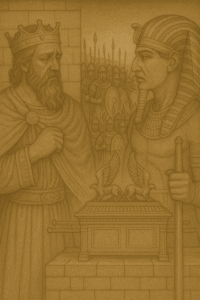Introduction.
2 Samuel Chapter 4 recounts a tragic moment in Israel’s history with the assassination of Ish-Bosheth, Saul’s son, who was the king of Israel’s northern tribes. This event marks the final collapse of Saul’s dynasty, paving the way for David to unify the kingdom. The chapter underscores themes of betrayal, justice, and the consequences of unchecked ambition.
The Assassination of Ish-Bosheth.
Following the death of Abner, Ish-Bosheth’s position as king becomes increasingly fragile. Two of his own men, Rechab and Baanah, see an opportunity to gain favor with David and conspire to kill Ish-Bosheth. They enter his house during the heat of the day while he is resting and assassinate him, decapitating his body and taking his head to David in Hebron.
Rechab and Baanah present Ish-Bosheth’s head to David, expecting a reward for eliminating his rival. However, their assumption proves to be a grave miscalculation.
David’s Justice.
Instead of rewarding the assassins, David condemns their actions as wicked and dishonorable. He reminds them of his consistent stance against those who harm the Lord’s anointed, referencing his previous dealings with the Amalekite who claimed to have killed Saul. David orders Rechab and Baanah to be executed, ensuring that justice is served for their treachery.
David’s response demonstrates his commitment to justice and his rejection of any means that undermine God’s law, even when they seemingly benefit his position as king.
Key Lessons from 2 Samuel Chapter 4.
- Betrayal and Its Consequences: The actions of Rechab and Baanah highlight the destructive nature of betrayal and the ultimate downfall it brings, even when motivated by ambition.
- Integrity in Leadership: David’s response to the assassination underscores the importance of integrity and adherence to God’s principles in leadership, even when faced with personal gain.
- God’s Sovereignty in Leadership Transitions: The collapse of Ish-Bosheth’s rule and the events leading to David’s eventual reign reflect God’s sovereignty in establishing leaders according to His plan.
Conclusion.
2 Samuel Chapter 4 illustrates the destructive consequences of betrayal and ambition, as well as the importance of justice and integrity in leadership. David’s handling of Ish-Bosheth’s assassination reveals his unwavering commitment to righteousness, setting a powerful example for leaders today. As we reflect on this chapter, let us be reminded of the value of justice, the dangers of ambition without integrity, and the sovereignty of God in guiding history.






